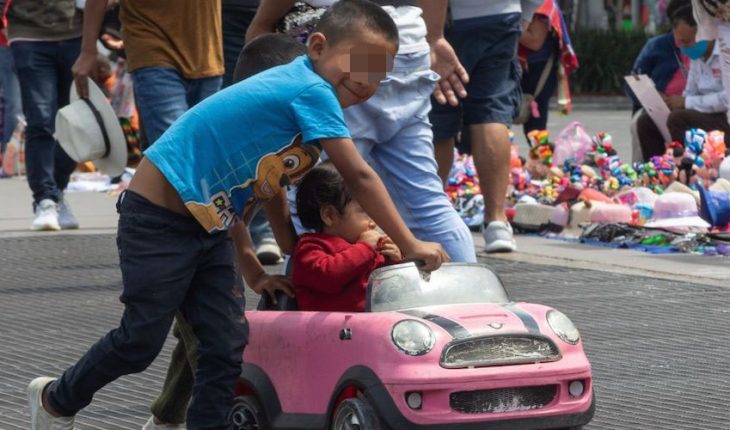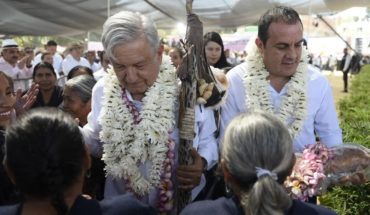The budget currently allocated by the Mexican government to children and adolescents, has recorded a 9-year setback, equivalent to 32 billion pesos, according to the report of the Early Childhood Collective “Evolution of the early childhood budget: Less and less for the youngest”.
The research was led by Alberto Tonathiu Sotomayor Avilés, with the aim of identifying the magnitude of resources budgeted for early childhood care, as well as knowing the evolution and components of public spending in the period 2018-2020.
This, using as the main source the data of the programmed public resources established in the Federation Egress Budgets for the years analyzed.
Read more: Early childhood risks and uncertainty from budget cuts
One of the revelations of the study is that in Mexico even though there is a significant legislative and institutional progress in early childhood, this is not translated into a budget strengthening for this group of the population from zero to six years.
“In Mexico, the concept of early childhood investment in the country has not been consolidated, because the public resources allocated to the guarantee of its rights are scarce and its linkage to an effective comprehensive policy for early childhood development is limited.”
Data shows that early childhood girls and boys account for one-third (33%) of the total population group from 0 to 18 years old. “However, of the total allocated resources receive only 10%.”
“Early childhood is the only age group that has consistently reduced resource allocation from 14% to 10% of resources… between 2018 and 2020.”
Program trimming
Social programs for children from zero to six years were also analyzed as part of this study. It was established that between 2018 and 2020 “17 early childhood budget programmes were eliminated and 7 new programmes emerged, so the final balance is a decrease of 10 programmes”.
“Among the programs that disappeared is the ‘Prospera Social Inclusion’ Program, in its two aspects, health and well-being, as well as the ‘Children’s Stays’ Program, which from various evaluations had proven their effectiveness in addressing the associated problems”.
“Among the new programmes is ‘Support for the Welfare of Children, Children of Working Mothers’ which has care coverage of only 14% of its target population, as well as excluding children from 0 to 1 year of age from the benefit and does not guarantee that the benefit actually granted is used for child care and care.”
The states that spend the least on children
It also establishes which federation entities have reduced their budget allocations for early childhood, except for the state of Chiapas, which increased by 6%.
“Among the federative entities that stand out for the magnitude of their reductions are: Jalisco, State of Mexico, Nuevo León, Baja California, Coahuila, Chihuahua, Sonora, Tamaulipas, Veracruz and Sinaloa”.
As much as is spent for each child in early childhood, it is concluded that the average annual per capita expenditure at the national level is 3,701 pesos and only 308 pesos per month, identifying deep inequalities at the subnational level.
Not only that. It is established that in contrasting the amount of social support in some of the current administration’s flagship programmes, all are superior to early childhood: 2.5 times more is spent on scholarships, more than 4 times on support for older adults, and 12 times more than young people who train in a workplace.
In addition, there are alerts about the possible impacts that government austerity measures will bring to address the COVID-19 pandemic, which includes a 75% reduction in materials and general supplies and services.
This will have “a greater impact on the early childhood population, as these chapters account for 26% of their total budget, while for children and adolescents it only accounts for 5%”.
Recommendations for child care
As part of the study, the Early Childhood Collective, made up of more than 450 members across the country, including civil society organizations, academia and business foundations, launch a series of recommendations and policy implications to try to reverse this nine-year budget setback with the population from zero to six years of age.
Recommendations one and two talk about “replenishing resources cut to essential early childhood well-being programmes, such as CONAFE’s Basic and Community Education Programme, and “replacing budget programmes that were eliminated with new programmatic alternatives that address the problems that have been left unattended”.
Another recommendation addresses the need to “modify the modality of the Initial Education Expansion Program to move from a U-to-an-S program, to achieve greater transparency, certainty, efficiency and effectiveness of the resources allocated to it that are distributed to the federal entities for their operation”.
In addition, due to the country’s critical economic situation from the COVID 19 pandemic, “it is suggested to start by funding a package of basic emergency services for children under the age of 6 in poverty”.
What we do in Animal Político requires professional journalists, teamwork, dialogue with readers and something very important: independence. You can help us keep going. Be part of the team.
Subscribe to Animal Politics, receive benefits and support free journalism #YoSoyAnimal.





